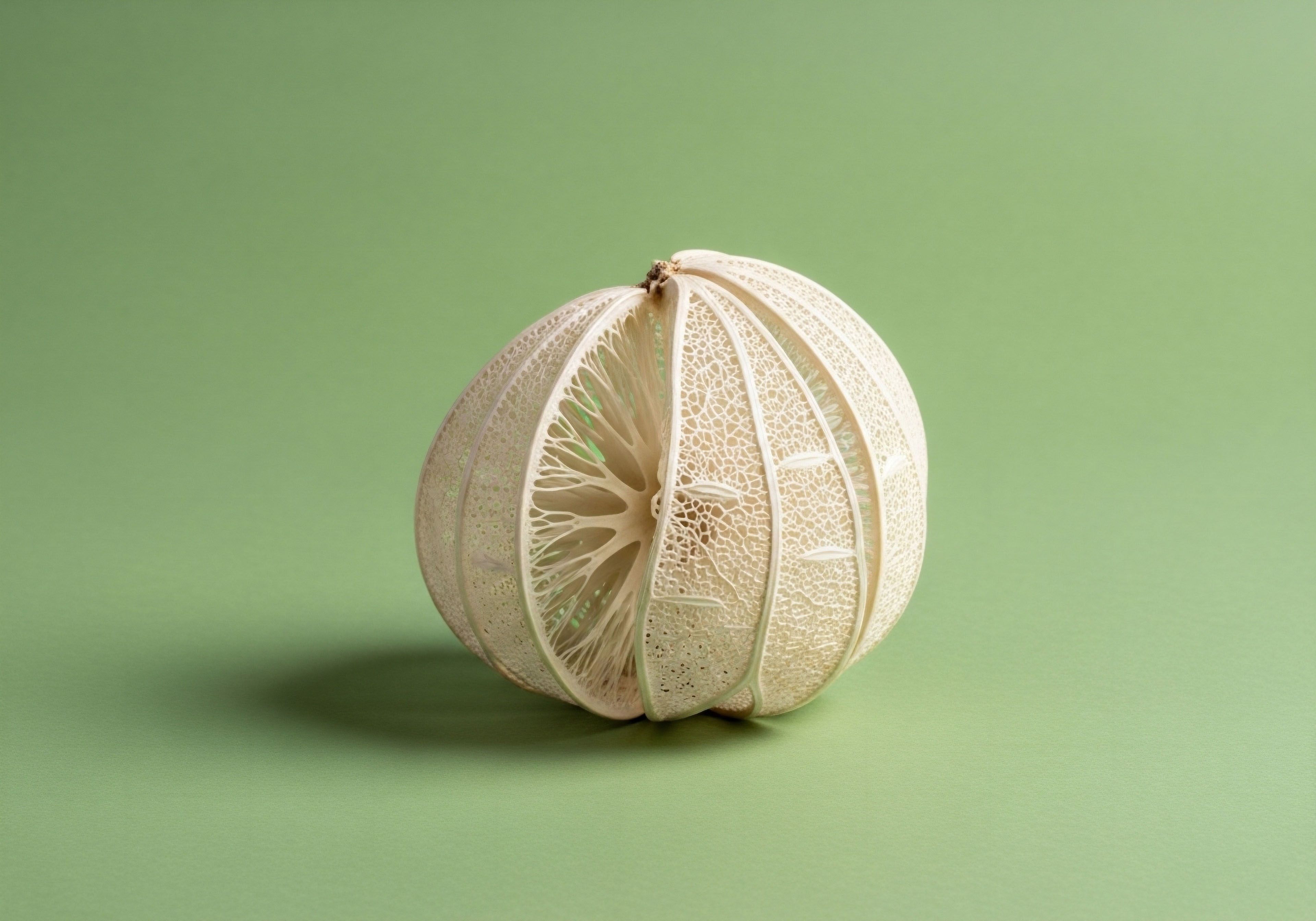

Fundamentals

Understanding Menopause Management
Menopause is a natural biological process marking the end of a woman’s menstrual cycles. It’s diagnosed after 12 consecutive months without a period. During this transition, the body’s production of hormones like estrogen and progesterone declines, leading to a range of symptoms that can affect daily life. Two primary approaches to managing these symptoms are Hormone Replacement Therapy (HRT) and lifestyle changes. Each offers a different path to relief, with distinct mechanisms and considerations.
HRT involves taking medication to replace the hormones the body no longer produces. This can effectively alleviate many of the most common and disruptive symptoms of menopause, such as hot flashes, night sweats, and vaginal dryness. Lifestyle changes, on the other hand, encompass a range of adjustments to daily habits, including diet, exercise, and stress management. These modifications can also help manage symptoms and improve overall health and well-being during and after menopause.

What Is Hormone Replacement Therapy
Hormone Replacement Therapy is a medical treatment that replenishes the hormones that decline during menopause. The primary hormone replaced is estrogen, which is responsible for regulating the menstrual cycle and has various other functions in the body. Progesterone is often included in HRT regimens for women who still have their uterus to protect against the risk of uterine cancer.
HRT is available in various forms, including pills, patches, gels, and creams, allowing for personalized treatment plans. The therapy is designed to restore hormonal balance, thereby reducing or eliminating menopausal symptoms. It is considered the most effective treatment for vasomotor symptoms like hot flashes and night sweats.

The Role of Lifestyle Changes
Lifestyle modifications offer a non-medical approach to managing menopause symptoms. These changes can be adopted alone or in conjunction with HRT to enhance overall well-being. Key lifestyle adjustments include:
- Dietary Changes ∞ A balanced diet rich in fruits, vegetables, and whole grains can support overall health. Limiting caffeine, alcohol, and spicy foods may help reduce hot flashes.
- Regular Exercise ∞ Physical activity, including aerobic exercises and strength training, can help manage weight, improve mood, and support bone health.
- Stress Management ∞ Techniques such as yoga, meditation, and deep breathing can help reduce stress and anxiety, which can exacerbate menopausal symptoms.
- Sleep Hygiene ∞ Establishing a regular sleep schedule and creating a comfortable sleep environment can improve sleep quality, which is often disrupted during menopause.

Key Differences at a Glance
The fundamental difference between HRT and lifestyle changes lies in their approach to symptom management. HRT directly addresses the hormonal imbalance that causes menopausal symptoms by replacing the missing hormones. Lifestyle changes, in contrast, work by supporting the body’s overall health and resilience, which can help mitigate the effects of hormonal fluctuations.
Hormone replacement therapy directly targets the hormonal deficiencies of menopause, while lifestyle changes aim to improve the body’s ability to cope with these changes.
HRT is a targeted medical intervention, while lifestyle changes represent a holistic approach to health and well-being. The choice between these two options, or a combination of both, depends on a woman’s individual symptoms, medical history, and personal preferences.


Intermediate

Efficacy and Symptom Relief
When comparing the effectiveness of HRT and lifestyle changes, it’s important to consider the specific symptoms being addressed. For vasomotor symptoms such as hot flashes and night sweats, HRT is widely recognized as the most effective treatment available. By replenishing estrogen levels, HRT can significantly reduce the frequency and severity of these symptoms, leading to improved quality of life.
Lifestyle changes can also play a role in managing vasomotor symptoms. For example, avoiding triggers like spicy foods and caffeine, dressing in layers, and keeping the bedroom cool can help manage hot flashes. Regular exercise and maintaining a healthy weight have also been shown to reduce the burden of hot flashes for some women.
However, the evidence for the effectiveness of lifestyle modifications in this area is mixed, and they may not provide sufficient relief for women with moderate to severe symptoms.

Bone Health and Long Term Benefits
Menopause is associated with an increased risk of osteoporosis due to the decline in estrogen, a hormone that plays a crucial role in maintaining bone density. HRT has been shown to be effective in preventing bone loss and reducing the risk of fractures in postmenopausal women. This is a significant long-term benefit of HRT that extends beyond symptom relief.
Lifestyle changes are also vital for maintaining bone health. Weight-bearing exercises, such as walking and strength training, can help preserve bone density. A diet rich in calcium and vitamin D is also essential for strong bones. While these lifestyle measures are important for all women, they may not be sufficient to prevent osteoporosis in those at high risk.

Risks and Side Effects
The decision to use HRT involves a careful consideration of its potential risks and benefits. For some women, HRT can increase the risk of certain health conditions, including blood clots, stroke, and breast cancer. The level of risk depends on various factors, such as the type of HRT, the dose, the duration of use, and the individual’s medical history.
Lifestyle changes, on the other hand, are generally considered safe and have numerous health benefits beyond menopause symptom management. However, it’s important to approach any new exercise regimen or dietary plan with caution and to consult with a healthcare provider to ensure it’s appropriate for your individual needs. The primary “risk” of relying solely on lifestyle changes is that they may not provide adequate relief for severe menopausal symptoms.
| Feature | Hormone Replacement Therapy (HRT) | Lifestyle Changes |
|---|---|---|
| Primary Mechanism | Replaces deficient hormones | Supports overall health and resilience |
| Hot Flash Relief | Highly effective | Moderately effective for some |
| Bone Health | Protects against bone loss | Supports bone density through diet and exercise |
| Potential Risks | Blood clots, stroke, certain cancers | Minimal, but may not be sufficient for severe symptoms |

Personalized Approach to Menopause Management
There is no one-size-fits-all approach to managing menopause. The optimal strategy depends on a woman’s unique symptoms, health profile, and personal preferences. For some, lifestyle changes alone may be sufficient to manage mild symptoms. For others, HRT may be necessary to alleviate more severe symptoms and improve quality of life.
A combination of HRT and lifestyle changes can often provide the most comprehensive approach to menopause management.
It’s also possible to combine HRT and lifestyle changes for a synergistic effect. A healthy lifestyle can complement the benefits of HRT and contribute to overall well-being during and after menopause. The decision-making process should involve a thorough discussion with a healthcare provider who can provide personalized guidance based on the latest medical evidence.


Advanced

Hormone Replacement Therapy Formulations and Delivery Methods
The field of HRT has evolved significantly, with a wide range of formulations and delivery methods now available. The choice of HRT regimen can have a profound impact on its safety and efficacy. For example, transdermal estrogen, delivered via patches or gels, is associated with a lower risk of blood clots compared to oral estrogen. This is because transdermal delivery bypasses the liver, where oral estrogen can increase the production of clotting factors.
The type of progestogen used in combination HRT is another important consideration. Micronized progesterone, which is structurally identical to the progesterone produced by the body, may have a more favorable risk profile than synthetic progestins. These nuances in HRT formulations allow for a more individualized approach to treatment, enabling healthcare providers to tailor regimens to each woman’s specific needs and risk factors.

The Critical Window Hypothesis
The “critical window” hypothesis suggests that the timing of HRT initiation is a key determinant of its long-term effects on cardiovascular health. According to this theory, starting HRT around the time of menopause may have a protective effect on the heart and blood vessels. However, initiating HRT later in life, particularly more than 10 years after menopause, may not offer the same benefits and could potentially increase cardiovascular risk.
This hypothesis has significant implications for clinical practice, underscoring the importance of early intervention for women who are candidates for HRT. It also highlights the need for a thorough assessment of a woman’s cardiovascular risk profile before starting treatment. The critical window theory is an area of ongoing research, and our understanding of the long-term effects of HRT continues to evolve.

Cognitive Behavioral Therapy for Menopause Symptoms
While lifestyle changes such as diet and exercise are widely discussed, the role of psychological interventions in managing menopause symptoms is often overlooked. Cognitive Behavioral Therapy (CBT) is a form of psychotherapy that has been shown to be effective in reducing the impact of menopausal symptoms, particularly hot flashes and night sweats.
CBT for menopause focuses on changing the way women perceive and respond to their symptoms. It involves techniques such as cognitive restructuring, which helps to identify and challenge negative thoughts about menopause, and behavioral strategies, such as paced breathing and relaxation exercises. By altering the cognitive and behavioral responses to symptoms, CBT can reduce their distressing effects and improve overall quality of life.
| Concept | Implications for Clinical Practice |
|---|---|
| HRT Formulations | Allows for individualized treatment to optimize safety and efficacy. |
| Critical Window Hypothesis | Emphasizes the importance of timing in HRT initiation for cardiovascular health. |
| Cognitive Behavioral Therapy | Offers a non-hormonal approach to managing the psychological and emotional aspects of menopause. |

The Future of Menopause Management
The landscape of menopause management is continually evolving, with ongoing research into new and innovative treatments. Advances in our understanding of the complex interplay between hormones, genetics, and lifestyle factors will likely lead to more personalized and effective therapies in the future. The development of selective estrogen receptor modulators (SERMs) and other targeted therapies may offer new options for women who are not candidates for traditional HRT.
As our knowledge grows, the future of menopause management will likely involve a more integrated approach that combines pharmacological, lifestyle, and psychological interventions to address the multifaceted nature of the menopausal transition.
Furthermore, there is a growing recognition of the importance of a multidisciplinary approach to menopause care, involving collaboration between gynecologists, endocrinologists, cardiologists, and mental health professionals. This holistic approach will be essential to ensure that women receive comprehensive and individualized care that addresses all aspects of their health and well-being during this important life stage.

References
- 1. “Menopause – Things you can do.” NHS, www.nhs.uk/conditions/menopause/things-you-can-do/.
- 2. “Pros and Cons of Hormone Replacement Therapy | AWHC.” Austin Women’s Health Center, 11 July 2024, www.austinwomenshealth.com/blog/pros-and-cons-of-hormone-replacement-therapy.
- 3. “What You Should Know About Hormone Therapy and Menopause.” Columbia University Irving Medical Center, 8 Feb. 2023, www.cuimc.columbia.edu/news/what-you-should-know-about-hormone-therapy-and-menopause.
- 4. “Menopause ∞ What It Is, Age, Stages, Signs & Side Effects.” Cleveland Clinic, my.clevelandclinic.org/health/diseases/21841-menopause.
- 5. “Menopause Relief – Hormone Replacement Therapy Pros & Cons | Dr. Jennifer Berman MD.” Dr. Jennifer Berman, 17 Apr. 2025, www.drjenniferberman.com/blog/menopause-relief-hormone-replacement-therapy-pros-cons.
- 6. “Benefits and risks of hormone replacement therapy (HRT).” NHS, www.nhs.uk/conditions/hormone-replacement-therapy-hrt/benefits-and-risks/.
- 7. “Hormone replacement therapy (HRT).” NHS, www.nhs.uk/conditions/hormone-replacement-therapy-hrt/.
- 8. “Is Hormone Replacement Therapy Safe? Pros and Cons of HRT.” City of Hope, 17 Sept. 2024, www.cityofhope.org/is-hormone-replacement-therapy-safe-pros-and-cons-of-hrt.
- 9. “Hormone Replacement Therapy ∞ Is It Right for You?” Cedars-Sinai, 8 Feb. 2023, www.cedars-sinai.org/blog/hormone-replacement-therapy.
- 10. “Menopause and HRT ∞ Hormone Replacement Therapy Types and Side Effects.” WebMD, 14 Jan. 2025, www.webmd.com/menopause/menopause-hormone-replacement-therapy.



